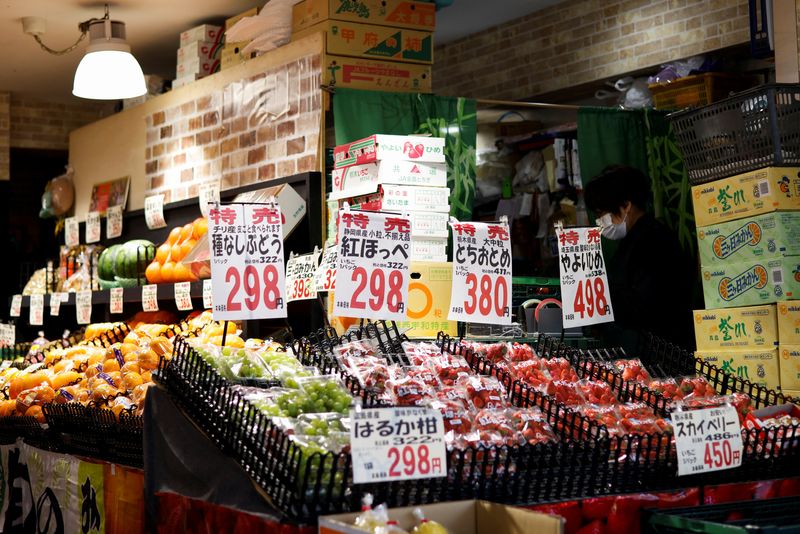
© Reuters. FILE PHOTO: A view of a vegetable stand with prices at a supermarket in Tokyo, Japan, March 24, 2023. REUTERS/Androniki Christodoulou
By Takahiko Wada and Leika Kihara
TOKYO (Reuters) -Core consumer inflation in Japan’s capital Tokyo slowed in March for a second month but remained well above the central bank’s 2% target, data showed on Friday, highlighting broadening price pressures in the world’s third-largest economy.
A separate index stripping away energy prices rose at the fastest year-on-year pace since 1990, the data showed, a sign the effect of government subsidies to curb utility bills did little to stem the rising cost of living for households.
The data underscores the challenge incoming Bank of Japan (BOJ) Governor Kazuo Ueda faces in assessing whether the recent cost-driven inflation will shift to one backed by solid demand and wage growth.
Core consumer prices in Tokyo, a leading indicator of nationwide trends, rose 3.2% in March from a year earlier, compared with a median market forecast for a 3.1% gain.
The pace of increase slowed from a 3.3% gain in February and a nearly 42-year high of 4.3% hit in January, due largely to the effect of government subsidies to curb utility bills.
An index for Tokyo stripping away fresh food and energy prices, which is closely watched by the BOJ as a gauge of demand-side price pressures, was 3.4% higher in March than a year earlier and faster than a 3.1% rise in February.
Japan’s economy is finally recovering from the scars of the COVID-19 pandemic after a delay, though risks of a global slowdown and rising food prices have clouded the outlook for exports and consumption.
In a glimmer of hope, factory output rose 4.5% in February from the previous month, government data showed on Friday, more than a median market forecast for a 2.7% gain.
Manufacturers surveyed by the government expect to increase output by 2.3% in March and by 4.4% in April, the output data showed.
With inflation already exceeding its target, markets are rife with speculation the BOJ could tweak or end yield curve control (YCC) when Ueda succeeds incumbent Haruhiko Kuroda whose second, five-year term ends in April.
YCC aims to control the shape of the yield curve to suppress short- to medium-term rates without depressing super-long yields too much.
BOJ officials have repeatedly said the central bank will not roll back its massive stimulus until recent cost-push inflation turns into one driven by strong demand, and ensures Japan achieves 2% inflation in a sustainable manner.
Stay connected with us on social media platform for instant update click here to join our Twitter, & Facebook
We are now on Telegram. Click here to join our channel (@TechiUpdate) and stay updated with the latest Technology headlines.
For all the latest Business News Click Here
For the latest news and updates, follow us on Google News.
